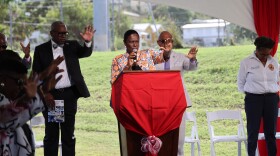ST. CROIX — The Virgin Islands Waste Management Authority has appealed to the Superior Court a Public Services Commission decision over an annual fee dispute.
WMA requested to pay an annual fee of $14,601.01 for fiscal year 2024 opposed to the PSC’s calculation of $449,199.83, representing a difference of $434,598.82.
The Waste Management Authority, in a motion filed with the Superior Court, Division of St. Thomas/St. John on Wednesday, requested that the court consider its appeal request even though it was not timely filed within the requested 60 days due to delays in getting transcripts of a February 13 PSC meeting from the Commission.
The five-member PSC unanimously denied the Authority’s petition for reconsideration of the annual assessment during the February meeting. Attorney Florence Kahugu, WMA legal counsel, said during the meeting that the Authority would be proceeding to Superior Court given the Commission’s denial of its petition. She submitted to the Superior Court on Wednesday a motion for leave to file an out-of-time petition of appeal on behalf of the Authority.
On April 23, over two months after the February 13 meeting, WMA received the PSC’s order denying the Authority’s petition for reconsideration, according to the motion. For the purpose of filing the petition of appeal, WMA requested a copy of the transcripts for the meeting, but they were not forthcoming. On July 19, after five months of numerous unsuccessful requests for the transcripts, WMA received the transcripts from the PSC and prepared the petition of appeal that is the subject of the motion.
Due to the delays encountered by WMA in getting the transcripts, the Authority noted in its two-page motion that the petition of appeal could not be timely filed within the requested 60 days after final action of the PSC upon the petition for reconsideration.
The PSC plans to oppose the Authority’s motion, according to attorney Boyd Sprehn, PSC general counsel.
Sprehn said appeals must be filed within 60 days after an order is given. He said the PSC’s written order was delivered to WMA on April 23, noting that June 23 would have been 60 days. He said WMA filed its motion two months too late. He said the fact the PSC did not immediately provide the transcripts does not give the Waste Management Authority an excuse for failing to comply with the statute because the PSC is not required to provide transcripts.
“The statute is very clear,” Sprehn said.
The PSC made its initial decision to uphold the amount owed in an order dated September 30, 2023. WMA petitioned the PSC for reconsideration of its annual assessment for FY 2024. WMA officials and PSC members discussed the petition during the meeting in February.
“Our position is that the calculations by PSC in reference to the annual fee for Waste Management were calculated with an error,” Kahugu said during the meeting.
Kahugu said the WMA and PSC differ in terms of the interpretation of the Virgin Islands Code, Title 30, Chapter 1, Subchapter I, Section 25a, which refers to the annual assessment that utilities must pay to the PSC prior to September 30 of each year. The annual fee for a particular public utility shall be an amount equal to the product of the Commission’s total current year assessments and the public utility’s revenue ratio, according to the law. The revenue ratio of a public utility shall be equal to its gross operating revenues divided by the territorial gross operating revenues. Gross operating revenues are defined as “the gross operating revenues of a public utility derived from intraterritorial regulated operations in the last preceding calendar year except as it relates to the Virgin Islands Water and Power Authority, gross operating revenue calculations do not include fuel charges, referred to as the LEAC (Levelized Energy Adjustment Charge).”
The Waste Management Authority’s main argument is that the intraterritorial regulatory operations that the PSC considers also adds the annual appropriation WMA receives from the government as well as special allocation funds, Kahugu said.
“Our position is that the government appropriation and special allocation funds should not be included as part of the intraterritorial regulated operations,” she said.
Daryl Griffith, WMA chief financial officer, who was named interim executive director of the Authority today following the end of Executive Director Roger Merritt Jr.’s contract, said during the meeting that gross operating revenue is the money generated from the core activities of a business. He said WMA has audits from 2018 to 2021 that clearly state and confirm the Authority’s gross operating revenue numbers.
“Unfortunately, the PSC calculated the Waste Management assessment incorrectly, using nonoperating revenue instead of operating revenue,” he said.
Griffith said the recalculation should bring WMA’s total annual fee for FY 2024 to the correct amount of $14,601 in compliance with the VI Code, Title 30, Section 25a.
“As soon as the PSC corrects its error, the Authority will immediately pay the remaining balance due,” he said.
David Hughes, PSC vice chair, asked Griffith to explain the Authority’s concurrence with the PSC’s calculation up to this point of disagreement.
“We have a long history of WMA concurring with our calculation, and it’s not clear to me what changed such that all of a sudden the definition of operating revenue is now no longer agreed upon between the two entities,” he said. “Is that just an error over time by every other of your predecessors?”
Griffith maintained that is the Authority’s position at this time.
“It’s our interpretation,” he said.
Hughes asked Griffith about whether the WMA disputes that over time the Authority agreed with the PSC’s calculation. Griffith said he did not know if WMA officials agreed in the past but noted that they paid the fee. Hughes said he was confused about how the Authority’s new position came about considering such long historical concurrence between the WMA and PSC.
Luis Sylvester, WMA deputy executive director, said the Authority has presented audited financial statements to the PSC on an annual basis.
“In our audited financial statement, it clearly delineated operating revenues and nonoperating revenues, so the PSC is the one who’s at fault for extracting the nonoperating revenues and including it in the final sum that has resulted in this extremely high assessment,” he said.
Sylvester said WMA presented those financial statement forms to the PSC, reiterating the Authority does not agree with the PSC.
“We don’t agree with your interpretation of what operating revenues are,” he said. “If you Google operating revenues, it says revenues generated by activities. Our appropriation is not generated by activities.”
Hughes asked if the WMA had ever requested the court to interpret the issue.
“I think this thing may have to go to court,” Sylvester said.















